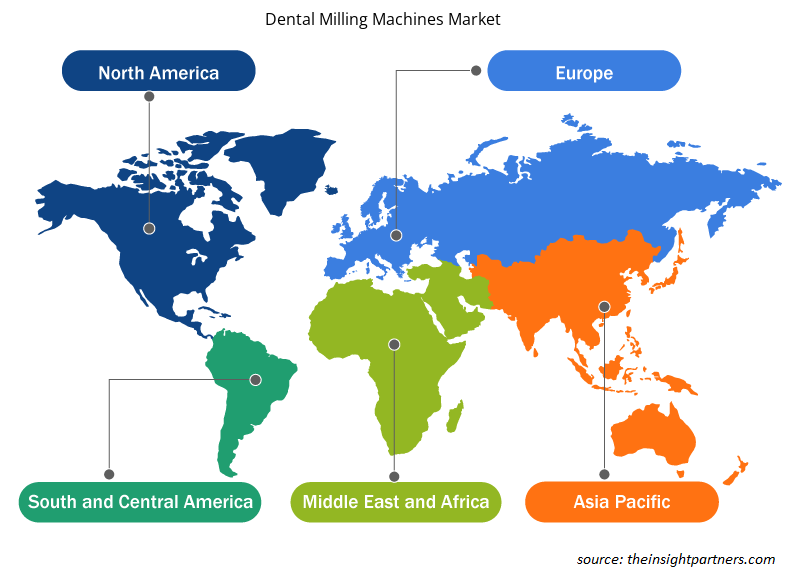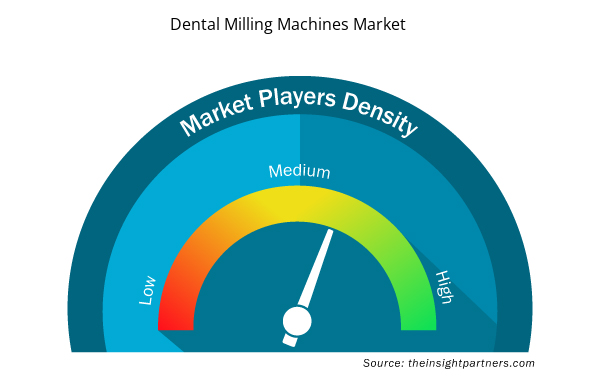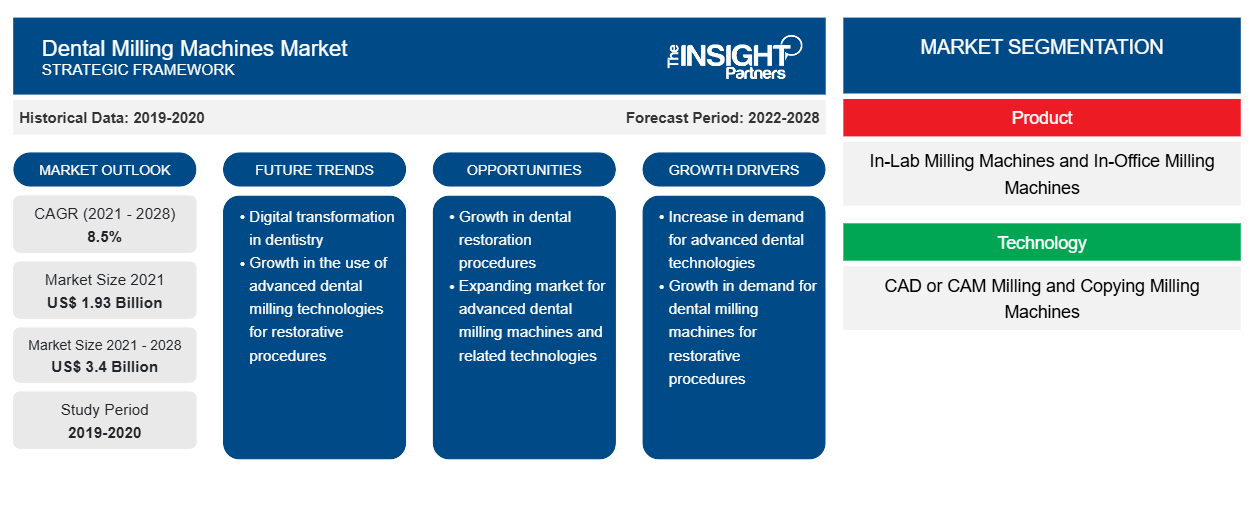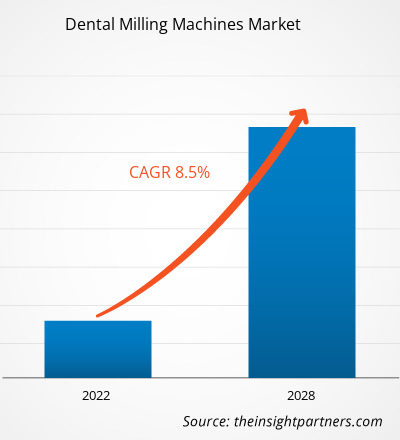من المتوقع أن ينمو سوق آلات طحن الأسنان من 1،934.83 مليون دولار أمريكي في عام 2021 إلى 3،398.72 مليون دولار أمريكي بحلول عام 2028؛ ومن المتوقع أن ينمو بمعدل نمو سنوي مركب قدره 8.5٪ من عام 2022 إلى عام 2028.
يتم تقسيم سوق ماكينات طحن الأسنان على أساس نوع المنتج والتكنولوجيا والتطبيق والمستخدم النهائي والجغرافيا. يقدم التقرير رؤى وتحليلات متعمقة للسوق، مع التركيز على معايير مختلفة مثل ديناميكيات السوق واتجاهاته وفرصه وتحليل المشهد التنافسي للاعبين الرئيسيين في السوق عبر مناطق مختلفة. كما يتضمن تحليل تأثير جائحة كوفيد-19 عبر المناطق.
رؤى السوق
العبء المتزايد لأمراض الأسنان وزيادة عدد السكان المسنين يدفعان نمو السوق
تعتبر أمراض الفم، بما في ذلك أمراض الأسنان، قابلة للوقاية بدرجة كبيرة. ومع ذلك، يمكن أن تشكل هذه الأمراض عبئًا صحيًا كبيرًا على العديد من البلدان وتؤثر على الأشخاص طوال حياتهم. تشمل بعض مشاكل الأسنان الشائعة تسوس الأسنان وأمراض اللثة وفقدان الأسنان. إن ارتفاع معدل الإصابة بأمراض الأسنان يعزز الطلب على استبدال الأسنان وتيجان الأسنان والأغطية والجسور السنية. وفقًا لتقرير حالة صحة الفم العالمية لمنظمة الصحة العالمية (2022)، تؤثر أمراض الفم على ما يقرب من 3 من كل 4 أشخاص على مستوى العالم، منهم حوالي 3.5 مليار شخص يعيشون في بلدان متوسطة الدخل. علاوة على ذلك، يعاني حوالي 2 مليار شخص على مستوى العالم من تسوس الأسنان الدائمة، ويعاني 514 مليون طفل من تسوس الأسنان الأولية. علاوة على ذلك، يستمر انتشار أمراض الفم الرئيسية في الزيادة على مستوى العالم مع التوسع الحضري المتزايد وتغير أنماط الحياة.
علاوة على ذلك، وفقًا لمنظمة الصحة العالمية، يمكن أن يكون فقدان الأسنان مؤلمًا نفسيًا ومضرًا اجتماعيًا ومحدودًا وظيفيًا. يمكن أن يحدث بسبب أمراض الفم المختلفة مثل تسوس الأسنان وأمراض اللثة الشديدة والصدمات. وفقًا لنفس المصدر، فإن متوسط انتشار فقدان الأسنان الكامل على مستوى العالم يقدر بنحو 7٪ بين الأشخاص الذين تتراوح أعمارهم بين 20 عامًا أو أكثر بينما بالنسبة للأشخاص الذين تتراوح أعمارهم بين 60 عامًا أو أكثر، فإن معدل انتشار فقدان الأسنان الكامل على مستوى العالم هو ~ 23٪. علاوة على ذلك، وفقًا لبيانات من توقعات الأمم المتحدة للسكان في العالم: مراجعة 2019، بحلول عام 2050، سيكون 1 من كل 6 أشخاص في العالم فوق سن 65 عامًا، أي 16٪، ارتفاعًا من 9٪ في عام 2019. وبالتالي، فإن زيادة عدد كبار السن على مستوى العالم والعبء المتزايد لأمراض الأسنان يعزز الطلب على استبدال الأسنان وإجراءات الترميم الأخرى، مما يغذي نمو سوق آلات طحن الأسنان.
قم بتخصيص هذا التقرير ليناسب متطلباتك
ستحصل على تخصيص لأي تقرير - مجانًا - بما في ذلك أجزاء من هذا التقرير، أو تحليل على مستوى الدولة، وحزمة بيانات Excel، بالإضافة إلى الاستفادة من العروض والخصومات الرائعة للشركات الناشئة والجامعات
- احصل على أهم اتجاهات السوق الرئيسية لهذا التقرير.ستتضمن هذه العينة المجانية تحليلاً للبيانات، بدءًا من اتجاهات السوق وحتى التقديرات والتوقعات.
رؤى تعتمد على نوع المنتج
بناءً على نوع المنتج، ينقسم سوق ماكينات طحن الأسنان إلى ماكينات طحن داخل المختبر وماكينات طحن داخل العيادة. في عام 2021، احتل قطاع ماكينات طحن داخل المختبر حصة أكبر من سوق ماكينات طحن الأسنان. ومع ذلك، من المتوقع أن يسجل قطاع ماكينات طحن داخل العيادة معدل نمو سنوي مركب أعلى خلال فترة التنبؤ. تُستخدم وحدات طحن مختبر الأسنان لتصنيع ترميمات الأسنان الكاملة أو الجزئية. تُستخدم ماكينات طحن الأسنان داخل المختبر لقطع التيجان والأغطية والأطر والجسور والدعامات المصنوعة من مواد مثل الزركونيا والراتنجات والسيراميك والشمع. تم تصميم ماكينات طحن الأسنان داخل المختبر لتلبية متطلبات مختبرات الأسنان من خلال الإنتاج الفعال من حيث التكلفة. تتميز معظم ماكينات الطحن داخل المختبر بارتفاعات أقراص معالجة متعددة بالإضافة إلى زوايا عمل توفر مرونة في الترميمات التي تدعمها ماكينات طحن الأسنان. تتضمن بعض الشركات التي تقدم آلات الطحن داخل المختبرات شركة Dentsply Sirona، وشركة CadBlu Inc.، وشركة AmannGirrbach GmbH، وشركة Ivoclar Vivadent Inc.، وشركة Jensen Dental.
رؤى مبنية على التكنولوجيا
بناءً على التكنولوجيا، ينقسم سوق ماكينات طحن الأسنان إلى ماكينات طحن CAD أو CAM وآلات طحن النسخ. احتل قطاع طحن CAD أو CAM الحصة الأكبر من السوق في عام 2021، ومن المتوقع أن ينمو بمعدل نمو سنوي مركب أعلى خلال فترة التنبؤ. في صناعة طب الأسنان، يشمل CAD / CAM استخدام البرامج لتصميم وطحن أطقم الأسنان الاصطناعية. يتضمن التصميم بمساعدة الكمبيوتر (CAD) المسح الرقمي للأطقم الاصطناعية، ويرسل التصنيع بمساعدة الكمبيوتر (CAM) النماذج النهائية إلى أجهزة الإخراج وتصنيعها بمساعدة الطباعة ثلاثية الأبعاد أو آلات الطحن. أصبح CAD / CAM تقنية واعدة في مجال طب الأسنان لأنه يتيح تسليم أطقم أسنان صناعية جمالية ومتينة وملائمة جيدًا للمرضى. يستخدم طب الأسنان عمليات إضافية وطرحية لإنتاج حالات مادية من نماذج ثلاثية الأبعاد. ومن المرجح أن تشهد ماكينات الطحن CAD/CAM نموًا كبيرًا في السنوات القادمة حيث ساعدت هذه التقنية على تحسين جودة الأطراف الاصطناعية وتوحيد عملية الإنتاج في طب الأسنان.
رؤى قائمة على التطبيق
بناءً على التطبيق، يتم تقسيم سوق آلات طحن الأسنان إلى التيجان وأطقم الأسنان والجسور والقشور والحشوات أو الحشوات. في عام 2021، احتل قطاع الجسور الحصة الأكبر من السوق ومن المتوقع أن يسجل أعلى معدل نمو سنوي مركب خلال فترة التنبؤ. جسور الأسنان هي أسنان مصنوعة خصيصًا تساعد في ملء مساحة سن أو أكثر مفقودة. وهي عبارة عن غرسات ثابتة أو أجهزة اصطناعية يتم تثبيتها على الغرسات أو الأسنان الموجودة بواسطة أخصائي أسنان معتمد. بصرف النظر عن تقوية السن التالف، فإن الجسور مفيدة لأنها تعمل على تحسين مظهر السن وشكلها ومحاذاتها وإطباق الأسنان (العضة). هناك أربعة أنواع رئيسية من جسور الأسنان، وهي جسور الأسنان التقليدية، والجسور المعلقة، وجسور ماريلاند، والجسور المدعومة بالغرسات. تعد جسور الأسنان التقليدية من بين أكثر أنواع جسور الأسنان استخدامًا وشعبية. يتم دعم الجسور المدعومة بالغرسات بواسطة آلات طحن الأسنان بدلاً من دعمها بواسطة التيجان أو الإطارات. يعتبر الطلب المرتفع على الجسور في ماكينات طحن الأسنان بمثابة عامل مستقل مسؤول عن نمو قطاع الجسور السنية في سوق ماكينات طحن الأسنان
رؤى تعتمد على المستخدم النهائي
بناءً على المستخدم النهائي، يتم تقسيم سوق آلات طحن الأسنان إلى مختبرات الأسنان وعيادات الأسنان والمعاهد البحثية والأكاديمية. في عام 2021، احتل قطاع مختبرات الأسنان الحصة الأكبر من السوق. ومن المتوقع أيضًا أن ينمو نفس القطاع بأعلى معدل نمو سنوي مركب خلال فترة التنبؤ. تشير مختبرات الأسنان إلى المختبرات التجارية وغرف التشغيل التي تشارك في أنشطة وإجراءات مختلفة متعلقة بالأسنان. تتكون هذه المختبرات من خدمات مختبرات الأسنان كاملة الخدمات التي تصنع مجموعة واسعة من الغرسات، بما في ذلك التيجان والجسور وأطقم الأسنان المرنة والمصبوبة والمحاذاة وغيرها من المنتجات. تكتسب مختبرات الأسنان شعبية حيث تقدم هذه المختبرات نتائج سريعة ودقيقة، مثل التسليم في نفس اليوم في العديد من المواقف. تستخدم المختبرات تقنيات متقدمة مثل الطباعة ثلاثية الأبعاد لإعداد منتجات الأسنان. يساعد هذا في التصميم الدقيق وفقًا لمتطلبات المريض.
يتبنى لاعبو سوق ماكينات طحن الأسنان استراتيجيات عضوية، مثل إطلاق المنتجات والتوسع، لتوسيع نطاق وجودهم ومحفظة منتجاتهم في جميع أنحاء العالم وتلبية الطلب المتزايد. استراتيجيات النمو غير العضوية التي شهدها السوق هي الشراكات والتعاون. سمحت استراتيجيات النمو هذه للاعبين في سوق ماكينات طحن الأسنان بتوسيع أعمالهم وتعزيز حضورهم الجغرافي. بالإضافة إلى ذلك، تساعد عمليات الاستحواذ والشراكات واستراتيجيات النمو الأخرى في تعزيز قاعدة عملاء الشركة وزيادة محفظة منتجاتها.
في يونيو 2021، دخلت Dentsply Sirona في شراكة مع 3Shape، وهي شركة مطورة ومصنعة لأجهزة المسح الضوئي ثلاثية الأبعاد وحلول برامج CAD/CAM ومقرها كوبنهاجن، الدنمارك. تركز الخطوة الأولى من هذه الشراكة على التعاون الميسر بين الماسح الضوئي داخل الفم من 3Shape، 3Shape TRIOS، وأجهزة تقويم الأسنان الشفافة SureSmile من Dentsply Sirona. وكجزء من خطواتهما نحو ابتكار طب الأسنان، وقيادة التحول الرقمي، وتحسين طب الأسنان الرقمي وصحة الفم، خططت Dentsply Sirona و3Shape للعمل على فرص استراتيجية متعددة.
في فبراير 2021، وسعت شركة Ivoclar Vivadent خط الطحن الخاص بها بإطلاق PrograMill DRY. إنها الآلة المثالية للمبتدئين لطحن أكسيد الزركونيوم. تتوفر وحدة الطحن الجاف ذات الخمسة محاور بتصميم مضغوط ويمكن وضعها بشكل مثالي في كل مختبر.
ماكينة طحن الأسنان
رؤى إقليمية حول سوق ماكينات طحن الأسنان
لقد قام المحللون في Insight Partners بشرح الاتجاهات والعوامل الإقليمية المؤثرة على سوق ماكينات طحن الأسنان طوال فترة التوقعات بشكل شامل. يناقش هذا القسم أيضًا قطاعات سوق ماكينات طحن الأسنان والجغرافيا في جميع أنحاء أمريكا الشمالية وأوروبا ومنطقة آسيا والمحيط الهادئ والشرق الأوسط وأفريقيا وأمريكا الجنوبية والوسطى.

- احصل على البيانات الإقليمية المحددة لسوق آلات طحن الأسنان
نطاق تقرير سوق ماكينات طحن الأسنان
| سمة التقرير | تفاصيل |
|---|---|
| حجم السوق في عام 2021 | 1.93 مليار دولار أمريكي |
| حجم السوق بحلول عام 2028 | 3.4 مليار دولار أمريكي |
| معدل النمو السنوي المركب العالمي (2021 - 2028) | 8.5% |
| البيانات التاريخية | 2019-2020 |
| فترة التنبؤ | 2022-2028 |
| القطاعات المغطاة | حسب المنتج
|
| المناطق والدول المغطاة | أمريكا الشمالية
|
| قادة السوق وملفات تعريف الشركات الرئيسية |
|
كثافة اللاعبين في سوق ماكينات طحن الأسنان: فهم تأثيرها على ديناميكيات الأعمال
يشهد سوق ماكينات طحن الأسنان نموًا سريعًا، مدفوعًا بالطلب المتزايد من المستخدم النهائي بسبب عوامل مثل تفضيلات المستهلك المتطورة والتقدم التكنولوجي والوعي المتزايد بفوائد المنتج. ومع ارتفاع الطلب، تعمل الشركات على توسيع عروضها والابتكار لتلبية احتياجات المستهلكين والاستفادة من الاتجاهات الناشئة، مما يؤدي إلى زيادة نمو السوق.
تشير كثافة اللاعبين في السوق إلى توزيع الشركات أو المؤسسات العاملة في سوق أو صناعة معينة. وهي تشير إلى عدد المنافسين (اللاعبين في السوق) الموجودين في مساحة سوق معينة نسبة إلى حجمها أو قيمتها السوقية الإجمالية.
الشركات الرئيسية العاملة في سوق ماكينات طحن الأسنان هي:
- شركة أمان جيرباخ
- دنتسبلي سيرونا المحدودة
- شركة إيفوكلار فيفادنت
- شركة دينتيوم المحدودة
- شركة ايمس ايكور المحدودة
إخلاء المسؤولية : الشركات المذكورة أعلاه ليست مرتبة بأي ترتيب معين.

- احصل على نظرة عامة على أهم اللاعبين الرئيسيين في سوق ماكينات طحن الأسنان
ماكينات طحن الأسنان - نبذة عن الشركة
- شركة أمان جيرباخ
- دنتسبلي سيرونا المحدودة
- شركة إيفوكلار فيفادنت
- شركة دينتيوم المحدودة
- شركة ايمس ايكور المحدودة
- شركة داترون ديناميكس
- شركة بي اند دي لطب الأسنان
- زوبلر الولايات المتحدة الأمريكية المحدودة
- شركة زيركونزان المحدودة
- باب انتردنت
- ميكانيكال SAS
- شركة 3M
- التحليل التاريخي (سنتان)، السنة الأساسية، التوقعات (7 سنوات) مع معدل النمو السنوي المركب
- تحليل PEST و SWOT
- حجم السوق والقيمة / الحجم - عالميًا وإقليميًا وقطريًا
- الصناعة والمنافسة
- مجموعة بيانات Excel



Report Coverage
Revenue forecast, Company Analysis, Industry landscape, Growth factors, and Trends

Segment Covered
This text is related
to segments covered.

Regional Scope
North America, Europe, Asia Pacific, Middle East & Africa, South & Central America

Country Scope
This text is related
to country scope.
الأسئلة الشائعة
The global dental milling machines based on regions is segmented into North America, Europe, Asia Pacific, Middle East & Africa, and South & Central America. In 2021, the North American area held the largest market share. However, the Asia Pacific region is estimated to grow at the fastest CAGR of 9.1% during the forecast period
The global dental milling machines based on the product are segmented into lab milling machines and in office milling machines. The in lab milling machines segment held a largest share of the market in 2021. However, the in-office milling machines segment registers the highest CAGR in the market during the forecast period.
The dental milling machines majorly consist of the players, such as Amann Girrbach AG, Dentsply Sirona Inc, Ivoclar Vivadent Inc, Dentium Co Ltd, imes-icore GmbH, DATRON Dynamics Inc, B&D Dental Corp, Zubler USA LLC, Zirkonzahn SRL, Interdent doo, Mecanumeric SAS, and 3M Co.
High cost of dental milling machines and unfavorable reimbursement policies are hampering the market growth..
The factors driving the growth of dental milling machines are The rising burden of dental diseases, increase in geriatric population and growing demand for cosmetic dentistry are the key driving factors behind the market development.
A dental milling machine is utilized to design and make simulated dental prosthetics by milling and grinding three-dimensional objects from a digital file using a computer-guided machine. The dental milling machine can produce extensions, removable dental prostheses, temporary prostheses, complete dentures, restoration, crowns, etc. Dental CAD-CAM milling machines use different kinds of blocks and blanks available in the market and are made of different materials according to the need of the prostheses.
List of Companies - Dental Milling Machines Market
- Amann Girrbach AG
- Dentsply Sirona Inc
- Ivoclar Vivadent Inc
- Dentium Co Ltd
- imes-icore GmbH
- DATRON Dynamics Inc
- B&D Dental Corp
- Zubler USA LLC
- Zirkonzahn SRL
- Interdent doo
- Mecanumeric SAS
- 3M Co.
The Insight Partners performs research in 4 major stages: Data Collection & Secondary Research, Primary Research, Data Analysis and Data Triangulation & Final Review.
- Data Collection and Secondary Research:
As a market research and consulting firm operating from a decade, we have published and advised several client across the globe. First step for any study will start with an assessment of currently available data and insights from existing reports. Further, historical and current market information is collected from Investor Presentations, Annual Reports, SEC Filings, etc., and other information related to company’s performance and market positioning are gathered from Paid Databases (Factiva, Hoovers, and Reuters) and various other publications available in public domain.
Several associations trade associates, technical forums, institutes, societies and organization are accessed to gain technical as well as market related insights through their publications such as research papers, blogs and press releases related to the studies are referred to get cues about the market. Further, white papers, journals, magazines, and other news articles published in last 3 years are scrutinized and analyzed to understand the current market trends.
- Primary Research:
The primarily interview analysis comprise of data obtained from industry participants interview and answers to survey questions gathered by in-house primary team.
For primary research, interviews are conducted with industry experts/CEOs/Marketing Managers/VPs/Subject Matter Experts from both demand and supply side to get a 360-degree view of the market. The primary team conducts several interviews based on the complexity of the markets to understand the various market trends and dynamics which makes research more credible and precise.
A typical research interview fulfils the following functions:
- Provides first-hand information on the market size, market trends, growth trends, competitive landscape, and outlook
- Validates and strengthens in-house secondary research findings
- Develops the analysis team’s expertise and market understanding
Primary research involves email interactions and telephone interviews for each market, category, segment, and sub-segment across geographies. The participants who typically take part in such a process include, but are not limited to:
- Industry participants: VPs, business development managers, market intelligence managers and national sales managers
- Outside experts: Valuation experts, research analysts and key opinion leaders specializing in the electronics and semiconductor industry.
Below is the breakup of our primary respondents by company, designation, and region:

Once we receive the confirmation from primary research sources or primary respondents, we finalize the base year market estimation and forecast the data as per the macroeconomic and microeconomic factors assessed during data collection.
- Data Analysis:
Once data is validated through both secondary as well as primary respondents, we finalize the market estimations by hypothesis formulation and factor analysis at regional and country level.
- Macro-Economic Factor Analysis:
We analyse macroeconomic indicators such the gross domestic product (GDP), increase in the demand for goods and services across industries, technological advancement, regional economic growth, governmental policies, the influence of COVID-19, PEST analysis, and other aspects. This analysis aids in setting benchmarks for various nations/regions and approximating market splits. Additionally, the general trend of the aforementioned components aid in determining the market's development possibilities.
- Country Level Data:
Various factors that are especially aligned to the country are taken into account to determine the market size for a certain area and country, including the presence of vendors, such as headquarters and offices, the country's GDP, demand patterns, and industry growth. To comprehend the market dynamics for the nation, a number of growth variables, inhibitors, application areas, and current market trends are researched. The aforementioned elements aid in determining the country's overall market's growth potential.
- Company Profile:
The “Table of Contents” is formulated by listing and analyzing more than 25 - 30 companies operating in the market ecosystem across geographies. However, we profile only 10 companies as a standard practice in our syndicate reports. These 10 companies comprise leading, emerging, and regional players. Nonetheless, our analysis is not restricted to the 10 listed companies, we also analyze other companies present in the market to develop a holistic view and understand the prevailing trends. The “Company Profiles” section in the report covers key facts, business description, products & services, financial information, SWOT analysis, and key developments. The financial information presented is extracted from the annual reports and official documents of the publicly listed companies. Upon collecting the information for the sections of respective companies, we verify them via various primary sources and then compile the data in respective company profiles. The company level information helps us in deriving the base number as well as in forecasting the market size.
- Developing Base Number:
Aggregation of sales statistics (2020-2022) and macro-economic factor, and other secondary and primary research insights are utilized to arrive at base number and related market shares for 2022. The data gaps are identified in this step and relevant market data is analyzed, collected from paid primary interviews or databases. On finalizing the base year market size, forecasts are developed on the basis of macro-economic, industry and market growth factors and company level analysis.
- Data Triangulation and Final Review:
The market findings and base year market size calculations are validated from supply as well as demand side. Demand side validations are based on macro-economic factor analysis and benchmarks for respective regions and countries. In case of supply side validations, revenues of major companies are estimated (in case not available) based on industry benchmark, approximate number of employees, product portfolio, and primary interviews revenues are gathered. Further revenue from target product/service segment is assessed to avoid overshooting of market statistics. In case of heavy deviations between supply and demand side values, all thes steps are repeated to achieve synchronization.
We follow an iterative model, wherein we share our research findings with Subject Matter Experts (SME’s) and Key Opinion Leaders (KOLs) until consensus view of the market is not formulated – this model negates any drastic deviation in the opinions of experts. Only validated and universally acceptable research findings are quoted in our reports.
We have important check points that we use to validate our research findings – which we call – data triangulation, where we validate the information, we generate from secondary sources with primary interviews and then we re-validate with our internal data bases and Subject matter experts. This comprehensive model enables us to deliver high quality, reliable data in shortest possible time.


 احصل على عينة مجانية لهذا التقرير
احصل على عينة مجانية لهذا التقرير